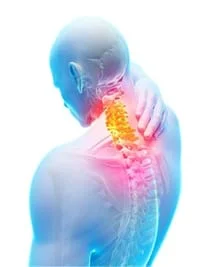How is Whiplash diagnosed?
The best way to recover from whiplash is to see a doctor specializing in whiplash and spinal trauma. This will ensure early diagnosis, appropriate treatment, timely referral and implementation of a whiplash self-management plan.
We will ask how the injury occurred and about your symptoms. Additional questions will be asked about how you are currently functioning at home, at work, in school and in any other activities.
A functional neurology and chiropractic exam will be done to include tests of your strength, reflexes, and sensation. We will also check balance and movement through space. If necessary, we will order additional tests such as x-ray, CT scan and/or MRI to ensure no other injuries have occurred and to complete our understanding of your condition.
Appropriate diagnosis and treatment will reduce the possibility of significant, life-long impairment affecting an individual's ability to function physically, cognitively, and psychologically. - Centers for Disease Control and Prevention (CDC)
How is Whiplash Treated?

Functional Neurology methods provide immediate “real time biological feedback” from your brain and body so we may design a customized program of care for your specific needs. We will then refine your program of care each visit to accelerate your healing, break free of symptoms and allow you to get on with your life.
Treatment may include:
- Functional Neurology
- Chiropractic
- Cranial Sacral Therapy
- Massage
- Acupuncture
- Nutrition
- Corrective Exercise
- Self-Management Skill Development
- Health and Wellness Coaching
Whiplash Self-Management Planning includes:

Following all recommendations of your functional neurology doctor.
- Getting plenty of sleep at night, and taking it easy during the day.
- Use ice or a cold pack on any swelling for 15 at a time with 15-30 minutes in between the next application. Always put a thin cloth between the ice and your skin.
- Avoid activities that are physically demanding such as housework, exercise, riding a bike, operating machinery and strenuous labor.*
- Avoid activities that are mentally demanding such as schoolwork, video games, text messaging, or using the computer.*
*Your doctor may require you to take time off from work if necessary or change your school or work schedule while you recover.
- Avoid alcohol and illegal drugs.
Take only prescription medications and over the counter medications as directed by your physician or functional neurology doctor.
- Ibuprofen or acetaminophen: These medicines decrease pain. They are available without a doctor's order. Ask your functional neurology doctor which medicine is right for you. Ask how much to take and how often to take it. Follow your functional neurology doctor’s directions.
- These medicines can cause stomach bleeding if not taken correctly. Ibuprofen can cause kidney damage. Do not take ibuprofen if you have kidney disease, an ulcer, or allergies to aspirin. Acetaminophen can cause liver damage. Do not drink alcohol if you take acetaminophen.
- Take your medicine as directed. Call your functional neurology doctor and or primary care doctor if you think your medicine is not helping or if you have side effects. Tell him/her if you are allergic to any medicine. Keep a list of the medicines, vitamins, and herbs you take. Include the amounts, and when and why you take them. Bring the list or the pill bottles to follow-up visits. Carry your medicine list with you in case of an emergency.
